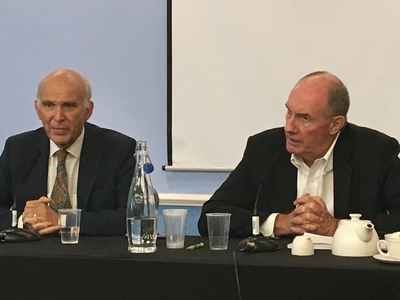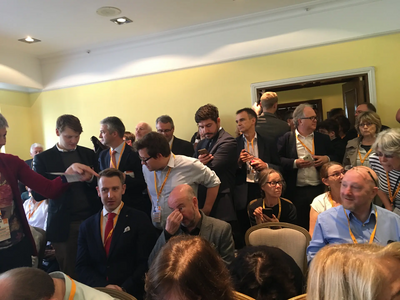Lib Dem Conference Diary: Day 2, Exit from Brexit
Exit from Brexit pretty much sums up how much the Lib Dems trust Theresa May to make a success of this constitutional experiment that Great Britain embarked upon. I don't think anyone in this party is particularly thrilled about inflation and the rising cost of living resulting from the Brexit uncertainty. Every day I hear stories of researchers whose projects have already been excluded from European cooperation, friends telling me about a reluctance to invest and further cuts within their companies, and accounts of non-British European friends who have (wrongly!) been told to leave the country. No one has a viable solution how to deal with the Irish border without threatening the peace process. So far, I am not digging this Brexit thing. As a creative person, I am disappointed that it is lacking the promised excitement of building a new better country which will be reformed so amazingly that the rest of the world goes green in jealousy.
The Lib Dems believe that Britain is better off in the EU - the question is just how we achieve staying in it. Today, we have the opportunity to debate and vote on a bold policy motion called 'Opposing Brexit': if the Lib Dems are elected into government before we leave the EU, we revoke article 50, no ifs or buts. It is a straight forward policy idea with a strong simple message. However, liberals wouldn't be liberals without debating other options. Tom Brake submitted an amendment to this motion to partly replace it: instead of revoking article 50 through a Parliamentary decision, we stick to campaigning for a second referendum once "the deal" is known so that the voters can decide between accepting the deal or revoking article 50. Additionally, the amendment wants to give the vote to 16 and 17 year olds, EU citizens resident in the UK and British people abroad. Unconditional revocation of article 50 vs a referendum on the Brexit terms - the auditorium is packed and members raise good arguments for both sides in a heated debate. Tim Farron delivers an energetic passionate speech in favour of the referendum: it can't be Parliament that makes the decision to
revoke article 50, it must be the people. Wera Hobhouse equally favours the referendum, making it three MPs that urge conference to pass the motion with the amendment. People speaking against the amendment argue that the Lib Dems do not aim to achieve a referendum, we aim to end Brexit and exit this mess. Britain is a representative democracy and if people elect the Lib Dems, they know what they are voting for. It is an exciting debate and demonstrates the non-hierarchical structure of the Lib Dems very well - ordinary members debate alongside established MPs and all members' votes carry equal weight. Conference passes the motion with the amendment which means the Lib Dems commit to fighting for a second referendum on the terms of "the deal" which gives the people the option to exit from Brexit if they are not happy with it. I am a slightly disappointed as I would prefer the party to take a bolder stance. It is a shame that the wording of the policy motion and the amendment excluded one another instead of allowing co-existence. I think we should have opted for a policy to revoke article 50 if there is an election in time, and if there won't be an election, fight for a referendum, but one advantage that the referendum policy has is its increasing cross-party support -
Brexit is a key decision that should not depend on the workings of one party alone, it should be achieved or ended in a cross-party effort.
It must be hard to follow such an intense debate, but Jo Swinson easily manages to captivate people with her speech. I don't think she will go for a pint with Donald Trump any time soon: "Trump is a bully, a misogynist and a racist!" She also reminds us that the world's problems aren't solved by a speech at Lib Dem conference, we "need to get out and bridge the divides". Another highlight of the day is the Q&A session with Vince Cable where his expertise in economic matters and his understanding of the business world shine through. Vince is pro-business and pro-worker and makes the point that it is in the public interest that businesses are regulated in some areas. He strongly believes in investment into infrastructure and promotes the expansion of transport links, notably investment across the north and the Northern Powerhouse.


Inspired by Jo and Vince, I wander off to some training sessions. My favourite one is the media skills session for Parliamentary Candidates where Josh Roche (a theatre director) and James Holt (former Lib Dem communications advisor) teach us potential candidates the dos and don'ts of public speaking and media work. Josh observes that paradoxically, actors always try not to act, whilst politicians always try hard to act - the latter being a bad idea for obvious reasons. The nation still
has not quite figured out the meaning behind Tony Blair's hand movements. Maybe he tried to distract us from the Iraq war.
My day ends Strong and Cable. I attend the Guardian/Observer columnist Will Hutton's interview with Vince Cable organised by the Social Liberal Forum. Vince expresses his regret that Brexit sucks out all energy of any government department, moving important issues such as corporate governance and industrial strategy to the back of priorities. I am pleased to hear that Vince Cable is in favour of wealth or asset taxation - the Lib Dems are the only party to engage in a serious debate on this issue. After the
interview, I approach Vince and mention that as a dual Swiss-British national, I have experienced asset taxation for years and that it is very common in many European countries. And that's how I find myself explaining the Swiss taxation system to our leader. You don't get to talk to a legend every day - the perks of Lib Dem conference!